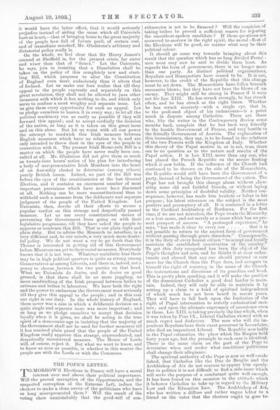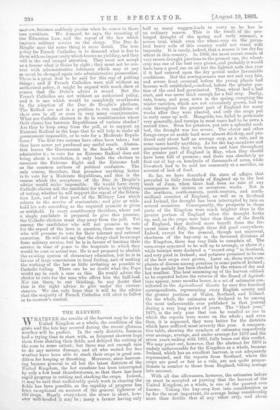THE POPE'S LETTER. T O-MORROW'S Elections in France will have a
moral interest over and above their political importance. Will the proved corruption of the Opportunists, and the suspected corruption of the Extreme Left, induce the electors to make a clean sweep of the politicians who have so long misrepresented them ? Will the result of the voting show unmistakably that the good-will of con- stituencies is not to be financed ? Will the suspicion of taking bribes be proved a sufficient reason for rejecting the smoothest-spoken candidate ? If these questions are answered to-morrow in the right spirit, the moral effect of the Elections will be good, no matter what may be their political colour. It should go some way towards bringing about this result that the question which has so long divided Frencl men most may now be said to divide them least. As regards the form of government, there is no longer more than one party. As distinct political organisations, Royalists and Bonapartists have ceased to be. It is not, however, to the credit of the Republic that this change must be set down. The Monarchists have fallen beneath successive blows ; but they have not been the blows of an enemy. They might still be strong in France if it were not for Leo XIII. He has struck strongly, he has struck often, and he has struck at the right times. Whether he has struck sincerely—with a single eye, that is, to the professed object of his endeavours—is a point much in dispute among Catholics. There are those who, like the writer in the Contemporary Review some months back, complain that he has been very friendly to the hostile Government of France, and very hostile to the friendly Government of Austria. The explanation of this inconsistency, they say, is to be found in the relations of the two Powers with the Kingdom of Italy. Whether this theory of the Papal motive is, or is not, true, there can be no question as to the nature and results of tho Papal action. It is Leo XIII. more than any one, who has placed the French Republic on the secure footing which it now holds. If the influence of the Church had continued to be thrown on the side of the Monarchists, the Republic would still have been the Government of a party, instead of being the Government of the nation. Tho Pope has not brought this change about without alien- ating some old and faithful friends, or without laying down some principles of doubtful validity. Neither con- sequence, however, has made him hesitate or falter in his purpose ; his latest utterance on the subject is the most positive and peremptory of all. It is contained in a letter to the Cardinal Archbishop of Bordeaux. For the first time, if we are not mistaken, the Pope treats the Monarchy as a lost cause, and not merely as a cause which has no pre- sent prospect of success. "*A. prolonged experience," he says, " has made it clear to every one that it is not possible to return to the ancient form of government, without passing through grave disorders." Consequently, it is the duty of every honest citizen " to accept and loyally maintain the established constitution of the country." To get this duty recognised has been the object of the Pope's thoughts and acts, and he thinks it at once unfor- tunate and absurd that any one should pretend to care more for the Church than the Pope does, and arrogate to himself the right of resisting in the name of the Church the instructions and directions of its guardian and head. This is pretty plain speaking, and it will make the position of the dissentient Catholics a good deal harder to main- tain. Indeed, they will only be able to maintain it by setting up a claim to a kind of spiritual independence of which much has not been heard in recent years. They will have to fall back upon the limitation of the right of Papal intervention to strictly ecclesiastical mat- ters ; and upon the ultimate supremacy of conscience even in these. Leo XIII. is taking precisely the line which, when it was taken by Pius IX., Liberal Catholics viewed with so much regret and disfavour. The men who will die im- penitent Royalists have their exact precursor in Lacordaire, who died an impenitent Liberal. The Republic now holds in the Papal estimation the place which the Empire held forty years ago, but the principle in each case is identical. There is the same claim on the part of the Pope to determine when and under what conditions politicians shall change their allegiance. The spiritual authority of the Pope is now so well estab- lished, that Catholics like the Duo de Broglie and the Archbishop of Aix do not venture to oppose him openly. But in politics it is not difficult to find a side-issue which will serve the purpose of a combatant quite well enough. It has been found on this occasion in the attitude which it behoves Catholics to take up in regard to the Military Lam and the Education Law. The Archbishop of Aix, who has written a diffuse and rather vague letter to a friend on the votes that the electors ought to give to- morrow, becomes suddenly precise when he comes to these two questions. We demand, he says, the recasting of the Education Law, and the repeal of the law which imposes military service on the clergy. The Due de Broglie says the same thing in more detail. The true policy for French Catholics is to demand what is due to them with an importunity which knows no yielding, and they will in the end compel attention. They must not accept as a favour what is theirs by right ; they must not be con- tent with administrative tolerance which may at any an )went be changed again into administrative persecution. There is a great deal to be said for this way of putting things ; and if French Catholics were still without an authorised policy, it might be argued with much show of reason that the Duke's advice is sound. But the French Catholics are not without an authorised policy, and it is one which would be completely overthrown by the adoption of the Due de Broglie's platform. The Rallied are not in a position to run candidates of their own in all or even in very many constituencies. What are Catholic electors to do in constituencies where their choice lies between Republicans of various shades ? Are they to keep away from the poll, or to support an Extreme Radical in the hope that he will help to make all government impossible, or to vote for a Moderate Repub- diean ? The first two courses have often been taken ; but they have never yet produced any useful result. Absten- tion leaves the Government in the hands which now administer it ; to vote for an Extreme Radical does not bring about a revolution, it only leads the electors to associate the Extreme Right and the Extreme Left as the common authors of political confusion. The only course, therefore, that promises anything better is to vote for a Moderate Republican, and this is the course which the acceptance of the Due de Broglie's advice would make impossible. He would have every Catholic elector ask the candidate for whom he is thinking of voting, whether he will support the repeal of the Educa- tion Law, and of that part of the Military Law which relates to the service of seminarists ; and give or with- hold his vote according as the required promise is given or withheld. In every constituency therefore, where not a single candidate is prepared to give this promise, the Catholic electors must stay away from the poll. Yet among the candidates who will not promise to vote for the repeal of the laws in question, there may be one who will promise to vote for their tolerant and rational execution. He will not say that the clergy shall be exempt from military service, but he is in favour of limiting their service in time of peace to the hospitals to which they would be sent in actual war. He is not prepared to abolish the existing system of elementary education, but he is in favour of large concessions to local feeling, and of making the working of the law as little irritating as possible to Catholic feeling. There can be no doubt what the Pope would say in such a case as, this. • He would advise the elector to vote for the man who offers him the half-loaf. Nor can there, to our thinking, be any doubt that this is the right advice to give under the circum- stances. We can only hope that it will be the advice that the majority of French Catholics will elect to follow in to-morrow's contest.



































 Previous page
Previous page